Peugeot 208 vs Genesis GV80 – Differences & prices compared
Compare performance, boot space, consumption and price in one view.
Find out now: which car is the better choice for you – Peugeot 208 or Genesis GV80?
The Peugeot 208 (Hatchback) comes with a Petrol, Electric or Petrol MHEV engine and Manuel or Automatic transmission. In comparison, the Genesis GV80 (SUV) features a Petrol or Diesel engine with Automatic transmission.
When it comes to boot capacity, the Peugeot 208 offers 352 L, while the Genesis GV80 provides 735 L – depending on how much space you need. If you’re looking for more power, decide whether the 156 HP of the Peugeot 208 or the 304 HP of the Genesis GV80 suits your needs better.
In terms of consumption, the values are 14.10 kWh4.50 L per 100 km for the Peugeot 208, and 8.80 L for the Genesis GV80.
Price-wise, the Peugeot 208 starts at 20200 £, while the Genesis GV80 is available from 59400 £. Compare all the details and find out which model fits your lifestyle best!
Peugeot 208
The Peugeot 208 exudes a distinctive French charm, combining sleek lines with an assertive stance on the road. Inside, it offers a modern and sophisticated cabin, complete with intuitive technology and high-quality finishes to enhance the driving experience. Its agile handling and efficient performance make it a delightful choice for both city commuting and longer journeys.
details @ www.media.stellantis.com
@ www.media.stellantis.com
 @ www.media.stellantis.com
@ www.media.stellantis.com
 @ www.media.stellantis.com
@ www.media.stellantis.com
 @ www.media.stellantis.com
@ www.media.stellantis.com
Genesis GV80
The Genesis GV80 impresses with its refined design and luxurious interior, offering an opulent driving experience that stands out in the luxury SUV segment. It delivers exceptional comfort and advanced technology features that enhance both driver and passenger enjoyment. The GV80 combines style and performance seamlessly, making it a compelling choice for those seeking sophistication on the road.
details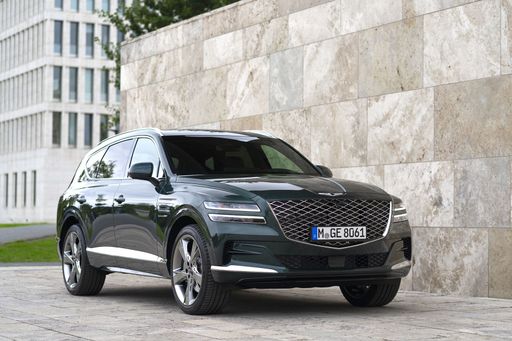 @ Genesis
@ Genesis
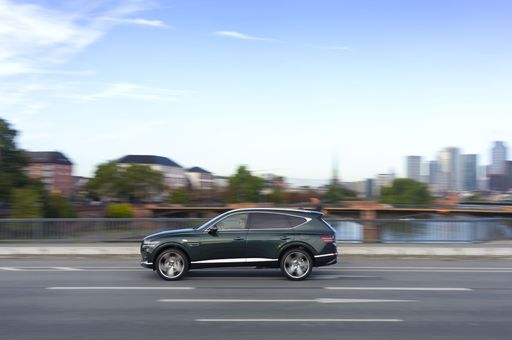 @ Genesis
@ Genesis
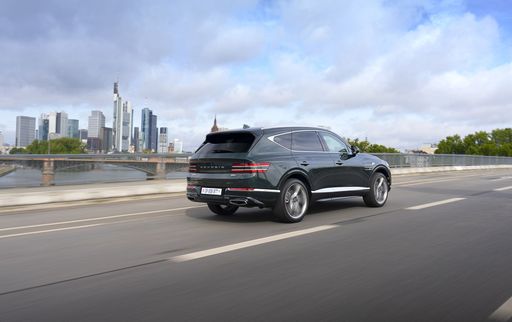 @ Genesis
@ Genesis
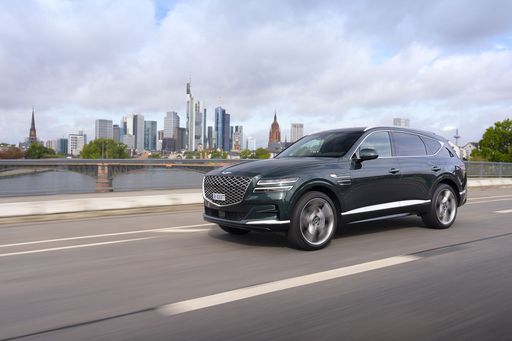 @ Genesis
@ Genesis
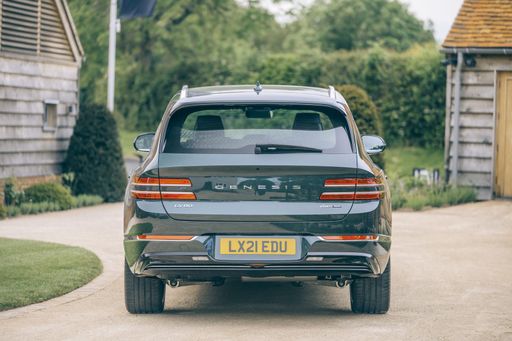 @ Genesis
@ Genesis
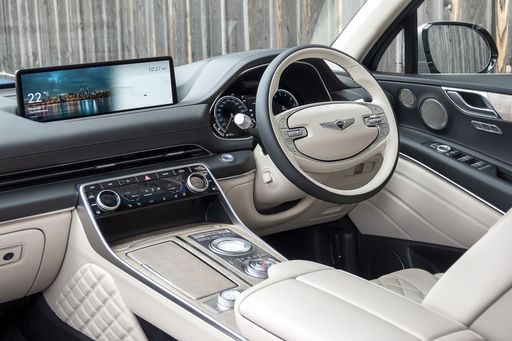 @ Genesis
@ Genesis

|

|
|
|
|
Costs and Consumption |
|
|---|---|
|
Price
20200 - 35100 £
|
Price
59400 - 75600 £
|
|
Consumption L/100km
4.5 - 5.2 L
|
Consumption L/100km
8.8 - 10.8 L
|
|
Consumption kWh/100km
14.1 - 15.4 kWh
|
Consumption kWh/100km
-
|
|
Electric Range
362 - 432 km
|
Electric Range
-
|
|
Battery Capacity
46 - 51 kWh
|
Battery Capacity
-
|
|
co2
0 - 117 g/km
|
co2
231 - 241 g/km
|
|
Fuel tank capacity
44 L
|
Fuel tank capacity
80 L
|
Dimensions and Body |
|
|---|---|
|
Body Type
Hatchback
|
Body Type
SUV
|
|
Seats
5
|
Seats
5 - 7
|
|
Doors
5
|
Doors
5
|
|
Curb weight
1165 - 1530 kg
|
Curb weight
2155 - 2325 kg
|
|
Trunk capacity
309 - 352 L
|
Trunk capacity
727 - 735 L
|
|
Length
4055 mm
|
Length
4945 mm
|
|
Width
1745 mm
|
Width
1975 mm
|
|
Height
1430 mm
|
Height
1715 mm
|
|
Payload
380 - 430 kg
|
Payload
660 - 690 kg
|
Engine and Performance |
|
|---|---|
|
Engine Type
Petrol, Electric, Petrol MHEV
|
Engine Type
Petrol, Diesel
|
|
Transmission
Manuel, Automatic
|
Transmission
Automatic
|
|
Transmission Detail
Manual Gearbox, Dual-Clutch Automatic, Reduction Gearbox
|
Transmission Detail
Automatic Gearbox
|
|
Drive Type
Front-Wheel Drive
|
Drive Type
All-Wheel Drive
|
|
Power HP
101 - 156 HP
|
Power HP
272 - 304 HP
|
|
Acceleration 0-100km/h
8.3 - 10.9 s
|
Acceleration 0-100km/h
6.90 s
|
|
Max Speed
150 - 200 km/h
|
Max Speed
230 - 237 km/h
|
|
Torque
205 - 270 Nm
|
Torque
422 - 588 Nm
|
|
Number of Cylinders
3
|
Number of Cylinders
4 - 6
|
|
Power kW
74 - 115 kW
|
Power kW
200 - 224 kW
|
|
Engine capacity
1199 cm3
|
Engine capacity
2497 - 2996 cm3
|
General |
|
|---|---|
|
Model Year
2023 - 2025
|
Model Year
2021 - 2022
|
|
CO2 Efficiency Class
D, A, C
|
CO2 Efficiency Class
G
|
|
Brand
Peugeot
|
Brand
Genesis
|
Peugeot 208
A Glimpse into the Future: The New Peugeot 208
The Peugeot 208, with its sleek design and innovative features, continues to set benchmarks in the automotive industry. As a hatchback, it seamlessly blends style with practicality, offering the perfect solution for urban driving and long-distance travels alike. In this article, we delve into the technical details and innovations that distinguish the latest iterations of the Peugeot 208.
Engine Options: Efficiency Meets Performance
The Peugeot 208 provides an array of engine options catering to different driving preferences. Featuring both petrol Mild-Hybrid technology and full electric powertrains, it offers a versatile range designed to accommodate eco-conscious drivers as well as those who prioritise performance.
With power outputs ranging from 101 PS to 156 PS, and a torque span of 205 Nm to 270 Nm, these machines are meticulously engineered to provide thrilling yet efficient drives. The petrol versions utilise a three-cylinder 1199 cm³ engine, optimising fuel consumption between 4.7 and 5.4 L/100km, while the electric e-208 models boast an impressive range of up to 410 km on a single charge.
Advanced Transmission Systems
The Peugeot 208 models come equipped with an advanced automatic transmission system, employing either a dual-clutch automatic gearbox or a manual transmission, depending on the chosen variant. These systems guarantee smooth gear transitions, thus enhancing driving pleasure and overall efficiency.
Performance and Environmental Considerations
From a performance standpoint, the Peugeot 208 impresses with its ability to accelerate from 0 to 100 km/h in between 8.3 to 10.9 seconds, depending on the model chosen. This level of performance is complemented by a top speed ranging from 150 to 200 km/h, ensuring that the 208 is more than capable of holding its own on the motorway.
With environmental consciousness at the forefront, the vehicle's CO2 efficiency class ranges from A to D, further establishing the Peugeot 208 as a responsible option for modern drivers keen on reducing their carbon footprint.
Comfort and Practicality: A Class Act
The interior of the Peugeot 208 reflects its exterior's stylish flair. It comfortably seats five passengers and offers a boot capacity of 265 to 309 litres, accommodating both city commutes and weekend getaways. Advanced comfort features and a state-of-the-art infotainment system ensure that rides are as enjoyable for passengers as they are for the driver.
Cost Considerations
The Peugeot 208 manages to strike a remarkable balance between cost efficiency and luxury. With prices ranging from €22,950 to €40,825, there is a variant to suit most budgets while still providing a premium experience. Additionally, the monthly costs and costs per kilometre are kept in check, making it an economically sound choice in the long term.
Dimensions and Design: Compact yet Spacious
Measuring 4,055 mm in length, 1,745 mm in width, and 1,430 mm in height, the Peugeot 208 maintains a compact profile that is perfectly suited to tight urban environments. Despite its manageable size, it offers ample space inside, thanks in part to clever design and engineering.
Conclusion: A Future-Proof Choice
The Peugeot 208 is a testament to modern automotive innovation. Whether powered by traditional engines or fully electric powertrains, it consistently delivers on performance, efficiency, and style. The combination of cutting-edge technology and sustainable practices places the Peugeot 208 as a forward-thinking choice for drivers seeking a vehicle that epitomises the best of contemporary motoring.
Genesis GV80
A New Era of Luxury: The Genesis GV80
In the world of luxury SUVs, the Genesis GV80 stands out as a beacon of innovation and style. With its sleek design, powerful engine options, and cutting-edge technology, the GV80 represents the pinnacle of automotive engineering. This article delves into the technical specifications and innovations that make the GV80 a remarkable vehicle in today's market.
Power and Performance
Under the hood, the Genesis GV80 offers a choice between robust petrol and efficient diesel engines, each designed to meet the demands of discerning drivers. The petrol variant is powered by a 2.5-liter engine, delivering a potent 304 horsepower, while the diesel option boasts a 3.0-liter engine with 272 horsepower. Both models come equipped with an advanced all-wheel-drive system and an automatic transmission, ensuring smooth and responsive handling in varied driving conditions.
The GV80's performance is further underscored by its impressive acceleration. It can sprint from 0 to 100 km/h in just 6.9 seconds, matching the expectations of luxury SUV enthusiasts. Furthermore, the petrol model offers a consumption rate of 10.8 L/100km, whereas the diesel is even more economical, at just 8.8 L/100km.
Design and Dimensions
Beyond performance, the Genesis GV80 is designed with a meticulous attention to detail. Its body type, a spacious SUV, offers versatility and comfort, accommodating up to seven passengers with its varying seating configurations. The vehicle's exterior dimensions – 4945 mm in length, 1975 mm in width, and 1715 mm in height – provide a commanding road presence while maintaining an elegant silhouette.
Inside, the GV80's luxury trim features high-end materials and a sophisticated layout, offering an unparalleled sense of comfort and refinement. The trunk capacity of 727 to 735 liters allows for ample storage, making it ideal for both everyday use and long-distance travel.
Innovative Technology
Genesis has ensured that the GV80 is equipped with the latest technological advancements. The SUV features an array of driver-assistance systems, including adaptive cruise control, lane-keeping assist, and a comprehensive suite of safety features such as automatic emergency braking. These technologies are designed to enhance the driving experience while ensuring maximum safety for all occupants.
Environmental Responsibility
The GV80 is also committed to reducing its environmental footprint. With CO2 emissions rated at 231 to 241 g/km, it aims to balance performance with efficiency. The diesel variant, in particular, offers greater fuel efficiency, contributing to a reduced environmental impact.
Conclusion
The Genesis GV80 embodies the perfect fusion of luxury, power, and innovation. Its range of features and superior design make it a strong contender in the competitive luxury SUV market. Whether it's the daily commute or a cross-country adventure, the GV80 promises an exceptional driving experience, underscoring Genesis' commitment to redefining luxury in the automotive world.
Which drive types are available for the Peugeot 208?
Available as Front-Wheel Drive.
The prices and data displayed are estimates based on German list prices and may vary by country. This information is not legally binding.
